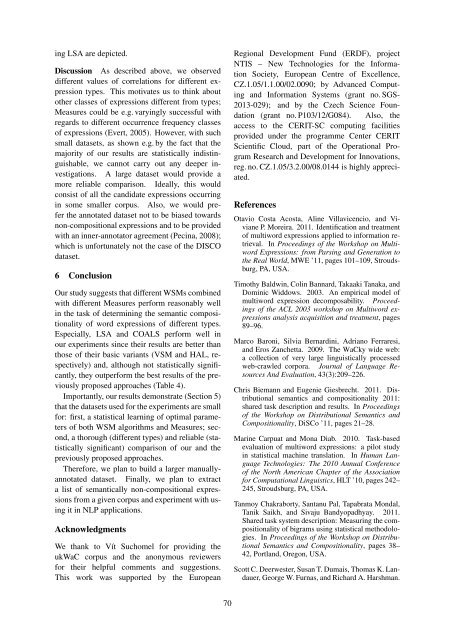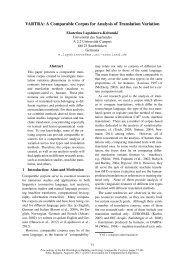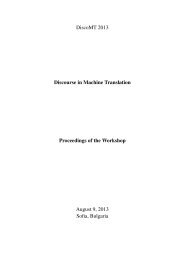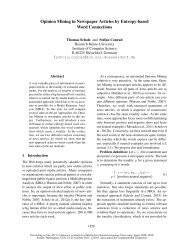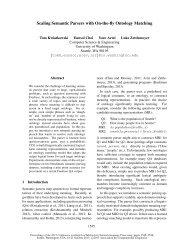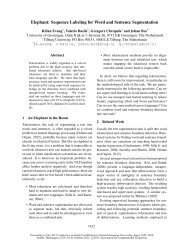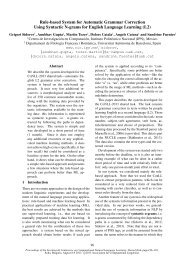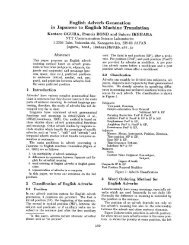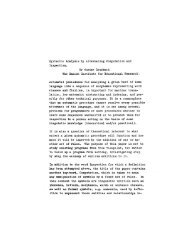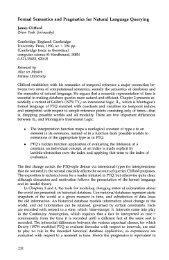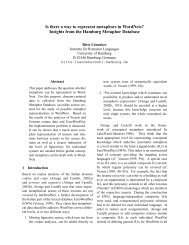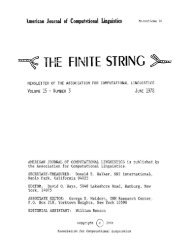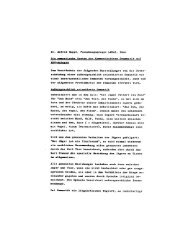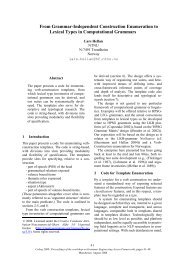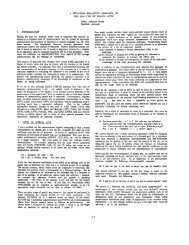Vector Space Semantic Parsing: A Framework for Compositional ...
Vector Space Semantic Parsing: A Framework for Compositional ...
Vector Space Semantic Parsing: A Framework for Compositional ...
Create successful ePaper yourself
Turn your PDF publications into a flip-book with our unique Google optimized e-Paper software.
ing LSA are depicted.<br />
Discussion As described above, we observed<br />
different values of correlations <strong>for</strong> different expression<br />
types. This motivates us to think about<br />
other classes of expressions different from types;<br />
Measures could be e.g. varyingly successful with<br />
regards to different occurrence frequency classes<br />
of expressions (Evert, 2005). However, with such<br />
small datasets, as shown e.g. by the fact that the<br />
majority of our results are statistically indistinguishable,<br />
we cannot carry out any deeper investigations.<br />
A large dataset would provide a<br />
more reliable comparison. Ideally, this would<br />
consist of all the candidate expressions occurring<br />
in some smaller corpus. Also, we would prefer<br />
the annotated dataset not to be biased towards<br />
non-compositional expressions and to be provided<br />
with an inner-annotator agreement (Pecina, 2008);<br />
which is un<strong>for</strong>tunately not the case of the DISCO<br />
dataset.<br />
6 Conclusion<br />
Our study suggests that different WSMs combined<br />
with different Measures per<strong>for</strong>m reasonably well<br />
in the task of determining the semantic compositionality<br />
of word expressions of different types.<br />
Especially, LSA and COALS per<strong>for</strong>m well in<br />
our experiments since their results are better than<br />
those of their basic variants (VSM and HAL, respectively)<br />
and, although not statistically significantly,<br />
they outper<strong>for</strong>m the best results of the previously<br />
proposed approaches (Table 4).<br />
Importantly, our results demonstrate (Section 5)<br />
that the datasets used <strong>for</strong> the experiments are small<br />
<strong>for</strong>: first, a statistical learning of optimal parameters<br />
of both WSM algorithms and Measures; second,<br />
a thorough (different types) and reliable (statistically<br />
significant) comparison of our and the<br />
previously proposed approaches.<br />
There<strong>for</strong>e, we plan to build a larger manuallyannotated<br />
dataset. Finally, we plan to extract<br />
a list of semantically non-compositional expressions<br />
from a given corpus and experiment with using<br />
it in NLP applications.<br />
Acknowledgments<br />
We thank to Vít Suchomel <strong>for</strong> providing the<br />
ukWaC corpus and the anonymous reviewers<br />
<strong>for</strong> their helpful comments and suggestions.<br />
This work was supported by the European<br />
Regional Development Fund (ERDF), project<br />
NTIS – New Technologies <strong>for</strong> the In<strong>for</strong>mation<br />
Society, European Centre of Excellence,<br />
CZ.1.05/1.1.00/02.0090; by Advanced Computing<br />
and In<strong>for</strong>mation Systems (grant no. SGS-<br />
2013-029); and by the Czech Science Foundation<br />
(grant no. P103/12/G084). Also, the<br />
access to the CERIT-SC computing facilities<br />
provided under the programme Center CERIT<br />
Scientific Cloud, part of the Operational Program<br />
Research and Development <strong>for</strong> Innovations,<br />
reg. no. CZ.1.05/3.2.00/08.0144 is highly appreciated.<br />
References<br />
Otavio Costa Acosta, Aline Villavicencio, and Viviane<br />
P. Moreira. 2011. Identification and treatment<br />
of multiword expressions applied to in<strong>for</strong>mation retrieval.<br />
In Proceedings of the Workshop on Multiword<br />
Expressions: from <strong>Parsing</strong> and Generation to<br />
the Real World, MWE ’11, pages 101–109, Stroudsburg,<br />
PA, USA.<br />
Timothy Baldwin, Colin Bannard, Takaaki Tanaka, and<br />
Dominic Widdows. 2003. An empirical model of<br />
multiword expression decomposability. Proceedings<br />
of the ACL 2003 workshop on Multiword expressions<br />
analysis acquisition and treatment, pages<br />
89–96.<br />
Marco Baroni, Silvia Bernardini, Adriano Ferraresi,<br />
and Eros Zanchetta. 2009. The WaCky wide web:<br />
a collection of very large linguistically processed<br />
web-crawled corpora. Journal of Language Resources<br />
And Evaluation, 43(3):209–226.<br />
Chris Biemann and Eugenie Giesbrecht. 2011. Distributional<br />
semantics and compositionality 2011:<br />
shared task description and results. In Proceedings<br />
of the Workshop on Distributional <strong>Semantic</strong>s and<br />
<strong>Compositional</strong>ity, DiSCo ’11, pages 21–28.<br />
Marine Carpuat and Mona Diab. 2010. Task-based<br />
evaluation of multiword expressions: a pilot study<br />
in statistical machine translation. In Human Language<br />
Technologies: The 2010 Annual Conference<br />
of the North American Chapter of the Association<br />
<strong>for</strong> Computational Linguistics, HLT ’10, pages 242–<br />
245, Stroudsburg, PA, USA.<br />
Tanmoy Chakraborty, Santanu Pal, Tapabrata Mondal,<br />
Tanik Saikh, and Sivaju Bandyopadhyay. 2011.<br />
Shared task system description: Measuring the compositionality<br />
of bigrams using statistical methodologies.<br />
In Proceedings of the Workshop on Distributional<br />
<strong>Semantic</strong>s and <strong>Compositional</strong>ity, pages 38–<br />
42, Portland, Oregon, USA.<br />
Scott C. Deerwester, Susan T. Dumais, Thomas K. Landauer,<br />
George W. Furnas, and Richard A. Harshman.<br />
70


